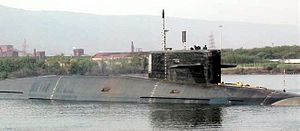The second Arihant-class nuclear-powered ballistic missile submarine (SSBN), INS Aridhaman, is slated to be launched in November or December of this year, according to Indian media reports.
A source told The Hindu that “final checks are under way.” The source adds that “all the three modules have been integrated.” The likely launch date is set for late November. That may be difficult to achieve, but “in December, it will definitely be in the sea,” according to another official source.
The Indian Navy’s latest indigenously-designed SSBN is currently being built under the Advanced Technology Vessel (ATV) project at the Ship Building Center in Visakhapatnam in the Indian state of Andhra Pradesh.
Following the its launch, the Aridhaman undergo further outfitting before the commencement of builders trials. The ship’s weapons systems will be installed last.
The boat’s reactor was already fueled in January. However, it will only go critical following a first set of sea trials to assess the Aridhaman’s performance and general seaworthiness.
The lead SSBN of the class, INS Arihant, was quietly commissioned in October 2016. The Arihant, based on the Russian Project 971 Akula I-class nuclear-powered attack submarine design, primarily serves as a technology demonstrator for the rest of the class and a training platform for future submarine crews.
The Aridhaman will purportedly have a more powerful reactor than the 6,000-ton Arihant and also be slightly bigger. In addition, compared to the lead boat of the class the Aridhaman will have double the number of missile hatches, with eight launch tubes rather than the Arihant’s four.
The Aridhaman will also carry more advanced sensors than its sister boat and feature the indigenously-developed USHUS integrated sonar system and the Panchendriya sonar, a unified submarine sonar and tactical control system used for detecting and tracking submarines, torpedoes, as well as underwater obstacles. It can also be used for underwater communication.
The SSBN can be armed with up to eight K-4 missiles. The K-4 is an intermediate-range nuclear-capable submarine-launched ballistic missile (SLBM), currently being development by India’s Defense Research & Development Organization (DRDO). It has an an estimated range of up to 3,500 kilometers. The Aridhaman will also be able to accommodate up to 24 K-15 Sagarika SLBMs with an estimated range of 700-750 kilometers.
The boat also boasts six 533-millimeter torpedo tubes. However, following the cancellation of a $200 million contract for 98 Black Shark heavyweight torpedoes at the end of May, the Aridhaman may not have the capability to defend itself against enemy subs for a number of years. As I explained:
A second batch of 49 Black Shark torpedoes was also to be installed aboard India’s domestically developed and built Arihant-class of nuclear-powered ballistic missile submarines. According to Indian media reports, at least three of India’s future fleet of four to five Arihant-class SSBNs were expected to carry the new torpedoes. The cancellation of the order could mean a two- to three-year delay in the launching of the second sub of the class, the Aridaman, due to torpedo tube modifications.
Alternative to the Black Shark torpedo are currently under evaluation. It is unclear how long the new bidding process will take. Nevertheless, the Indian Navy reportedly still plans to induct the second boat of the Arihant-class by 2019. India intents to build at least three more SSBNs of the class.
































